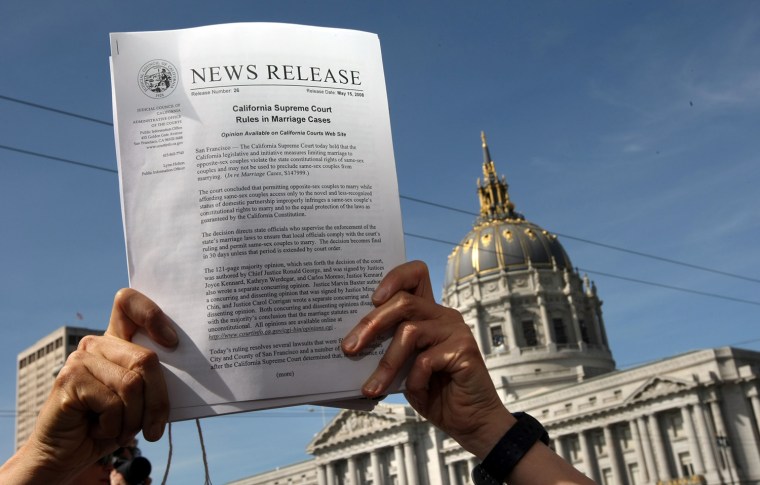Proponents of California's Proposition 8, the ballot initiative that stopped same-sex marriage in the state, are pursuing an aggressive legal strategy, hoping to revive the ban that state officials have declared dead.
In the month since the U.S. Supreme Court ruled that the initiative's sponsors did not have the legal standing to appeal a lower court ruling that declared Prop 8 unconstitutional, they have focused their efforts on the California Supreme Court, where they argue that Prop 8 remains valid and in effect.
The state justices must "intervene and breathe enforcement life into Proposition 8," stopping the issuance of any further same-sex marriage licenses, the Prop 8 sponsors say in court filings.
They have found an ally in Ernest Dronenburg, Jr, the San Diego County clerk, who has filed a lawsuit of his own, arguing that "state law defining marriage as a union between a man and a woman continues to govern throughout the state."
Members of San Diego County's Board of Supervisors say Dronenburg stepped into the legal maelstrom on his own, without consulting other county officials.
Late Tuesday, in a brief one-sentence order, the state Supreme Court denied his request for an immediate halt to the issuance of same-sex marriage licenses while the court considers the issue. The court last week turned down a similar request for a stay from the Prop 8 backers.
California's Attorney General, Kamala Harris, is fighting these latest efforts to stop the state from granting marriage licenses to gay couples. The current legal framework, she said, "requires all 58 counties to perform same-sex marriages. No exceptions."
Statewide, figures are not available, but California officials say San Francisco has issued nearly 900 marriage licenses to same-sex couples since state authorities ordered clerks to resume issuing them on June 28, two days after the U.S. Supreme Court disposed of the case.
At the heart of the dispute is a decision by a federal trial court in 2010. Judge Vaughn Walker ruled in favor of two gay couples, living in two separate counties, who challenged Prop 8. He declared the measure unconstitutional and issued an order forbidding enforcement of Prop 8 by the two county clerks who refused to issue marriage licenses to the couples.
Walker’s order was also directed at California's governor, attorney general, and two other state officials who supervise county clerks and control the wording and recording of marriage licenses.
But lawyers for the Prop 8 proponents say that order "does not require any county clerk to cease future enforcement of Proposition 8." The court's authority, they claim, was limited to ruling in favor of the two couples who sued. Now that they have gotten their licenses and are married, "all relief due under that injunction has already been provided."
As a result, they argue, California's county clerks are free -- what's more, required -- to resume enforcing Prop 8 by ceasing to issue marriage licenses to same-sex couples.
They also argue that even if the federal judge's order has continuing legal effect, it doesn't apply to county clerks. The state officials barred from enforcing Prop 8, the lawyers say, have no authority over county clerks when it comes to issuing marriage licenses.
Dronenburg, the San Diego County clerk, makes the same argument.
"The legislature has designated county clerks as the only government officials with authority to issue marriage licenses." State law, he said, "has not directed any state official to oversee or control county clerks when they are carrying out that duty."
Not so, counters Harris, the state's attorney general.
"County clerks and recorders are state officials subject to the supervision and control" of the state officials covered by the federal judge's 2010 order, she said. Federal judges have authority to issue orders that apply statewide, even in cases brought by individual plaintiffs, she said.
She also argued that by taking their dispute to the California Supreme Court, the Prop 8 supporters have gone to the wrong place to object to the scope or validity of a federal judge's ruling.
"That question is properly presented, if at all, to the federal district court," Harris said.
Further legal briefs are due by next week in the state Supreme Court. It has set no deadline for acting, but it will likely issue a decision soon. The justices have already denied a request from the Prop 8 supporters to stop the issuance of further same-sex marriage licenses until this latest dispute is resolved.
